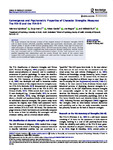Convergence and Psychometric Properties of Character Strengths Measures: The VIA-IS and the VIA-IS-R
| dc.contributor.author | Vylobkova, V | |
| dc.contributor.author | Heintz, Sonja | |
| dc.contributor.author | Gander, F | |
| dc.contributor.author | Wagner, L | |
| dc.contributor.author | Ruch, W | |
| dc.date.accessioned | 2022-04-26T11:50:11Z | |
| dc.date.available | 2022-04-26T11:50:11Z | |
| dc.date.issued | 2022-03-17 | |
| dc.identifier.issn | 0022-3891 | |
| dc.identifier.issn | 1532-7752 | |
| dc.identifier.uri | http://hdl.handle.net/10026.1/19072 | |
| dc.description.abstract |
This study compares the German versions of the original measure of character strengths (VIA-IS) with its latest revision (VIA-IS-R) regarding reliability and convergent, discriminant, and criterion-related validity. A sample of 499 German-speaking adults (79% women, mean age: 33.3 years) provided self-reports of character strengths (VIA-IS, VIA-IS-R) and several criteria: Core virtues, thriving, and moral behaviors. Results suggested that both measures showed satisfactory internal consistency and converged well in a multitrait-multimethod analysis. Further, both measures were comparable regarding their relationships with the criteria. Overall, the results of the current study suggest that both questionnaires are reliable and valid, and that findings based on these instruments can be considered highly comparable. | |
| dc.format.extent | 1-8 | |
| dc.format.medium | Print-Electronic | |
| dc.language | en | |
| dc.language.iso | eng | |
| dc.publisher | Routledge | |
| dc.subject | Adult | |
| dc.subject | Humans | |
| dc.subject | Female | |
| dc.subject | Male | |
| dc.subject | Psychometrics | |
| dc.subject | Reproducibility of Results | |
| dc.subject | Virtues | |
| dc.subject | Surveys and Questionnaires | |
| dc.subject | Self Report | |
| dc.title | Convergence and Psychometric Properties of Character Strengths Measures: The VIA-IS and the VIA-IS-R | |
| dc.type | journal-article | |
| dc.type | Journal Article | |
| dc.type | Research Support, Non-U.S. Gov't | |
| plymouth.author-url | https://www.webofscience.com/api/gateway?GWVersion=2&SrcApp=PARTNER_APP&SrcAuth=LinksAMR&KeyUT=WOS:000770243800001&DestLinkType=FullRecord&DestApp=ALL_WOS&UsrCustomerID=11bb513d99f797142bcfeffcc58ea008 | |
| plymouth.issue | 1 | |
| plymouth.volume | 105 | |
| plymouth.publication-status | Published | |
| plymouth.journal | Journal of Personality Assessment | |
| dc.identifier.doi | 10.1080/00223891.2022.2044342 | |
| plymouth.organisational-group | /Plymouth | |
| plymouth.organisational-group | /Plymouth/Faculty of Health | |
| plymouth.organisational-group | /Plymouth/Faculty of Health/School of Psychology | |
| plymouth.organisational-group | /Plymouth/REF 2021 Researchers by UoA | |
| plymouth.organisational-group | /Plymouth/REF 2021 Researchers by UoA/UoA04 Psychology, Psychiatry and Neuroscience | |
| plymouth.organisational-group | /Plymouth/REF 2021 Researchers by UoA/UoA04 Psychology, Psychiatry and Neuroscience/UoA04 Psychology, Psychiatry and Neuroscience MANUAL | |
| plymouth.organisational-group | /Plymouth/Research Groups | |
| plymouth.organisational-group | /Plymouth/Research Groups/Plymouth Institute of Health and Care Research (PIHR) | |
| plymouth.organisational-group | /Plymouth/Users by role | |
| plymouth.organisational-group | /Plymouth/Users by role/Academics | |
| dc.publisher.place | England | |
| dcterms.dateAccepted | 2022-02-13 | |
| dc.rights.embargodate | 2022-4-27 | |
| dc.identifier.eissn | 1532-7752 | |
| dc.rights.embargoperiod | Not known | |
| rioxxterms.versionofrecord | 10.1080/00223891.2022.2044342 | |
| rioxxterms.licenseref.uri | http://www.rioxx.net/licenses/all-rights-reserved | |
| rioxxterms.type | Journal Article/Review |


